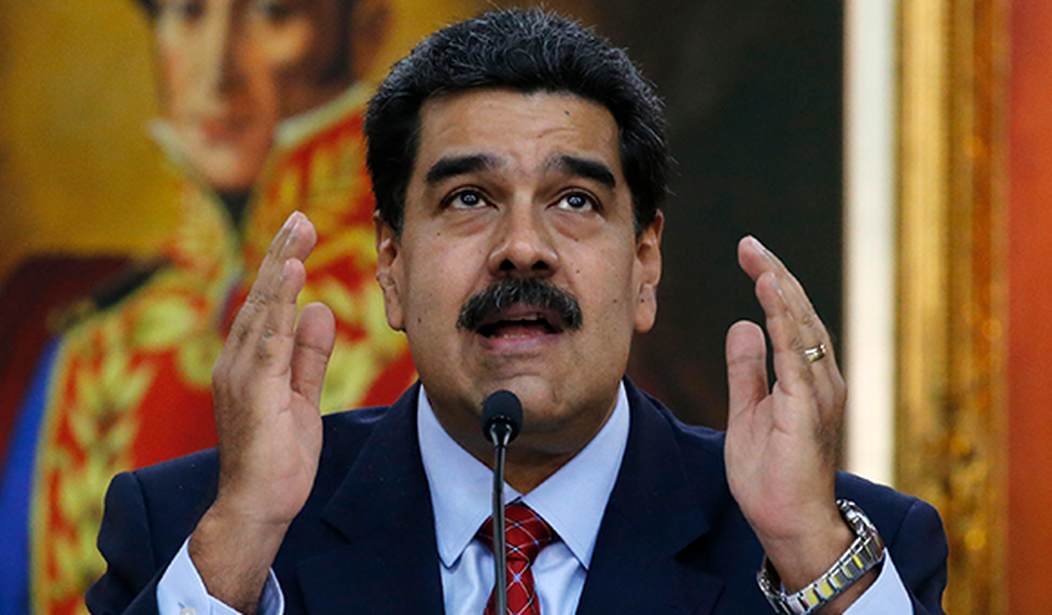In 2018, the BBC reported U.N. officials were comparing the Venezuelan refugee problem to the "Mediterranean crisis" spurred by the civil wars in Syria and Libya.
The comparison still has unfortunate merit. Venezuelan dictator Nicolas Maduro and his regime wage what amounts to a slow war of oppression and starvation on their own people. Thanks to the regime's catastrophic socialist economic policies, life for Venezuelans lacking regime connections is wretched.
So they flee. 4.3 million Venezuelans (13 percent of the population) have fled Maduro's gulag, and 5,000 more flee each day. U.N. refugee experts expect the figure to rise to 5 million by January 2020 and 5.8 million by mid-2020. Maduro shrugs -- fewer people to oppose him.
Diplomats call Venezuela the biggest humanitarian crisis in the hemisphere and a crisis with troubling and potentially violent regional consequences.
Here are some quantifiable consequences: Colombia hosts at least 1.3 million Venezuelan refugees. Peru has 800,000 refugees, Chile 300,000, impoverished Ecuador 260,000 and Brazil about 180,000. Others spread throughout the hemisphere.
Maduro's relentless man-made humanitarian disaster definitely has immediate and potential security consequences.
On Sept. 23, the U.S. and 11 other signatory governments invoked a sometimes-controversial Western Hemisphere mutual defense pact negotiated and signed in the late 1940s: The Inter-American Treaty of Reciprocal Assistance of 1947, nicknamed the Rio Treaty. The U.S. State Department often refers to it by its Spanish acronym, TIAR.
Recommended
Mutual defense pacts are for war. TIAR was last invoked on 9/11. It was activated during the Cuban missile crisis.
There is a military threat element. Maduro recently threatened to reignite neighboring Colombia's quiescent civil war by supporting Marxist guerrillas based in Venezuela. In fact, the Venezuelan military recently deployed 150,000 troops on the Colombian border.
A U.S. State Department press release made that point clear. "Recent bellicose moves by the Venezuelan military to deploy along the border with Colombia as well as the presence of illegal armed groups and terrorist organizations in Venezuelan territory demonstrate that Nicolas Maduro not only poses a threat to the Venezuelan people, his actions threaten the peace and security of Venezuela's neighbors."
But the refugee crisis is central to this "soft and hard" power application of the Rio Treaty.
A flood of refugees is not a military invasion. However, an unrelenting refugee exodus can have war-like economic and social effects on host nations. "War-like" isn't a stretch. Refugee waves have shaken politically and economically fragile central African states and sparked internal violence.
Colombian President Ivan Duque said addressing the Venezuelan refugee problem has cost his nation 0.5% of its annual GDP. That may seem small, but it represents a lot of money Venezuela has forced Colombia to spend. Brazil reported the refugee influx has strained health and education services in its poor northern states. Regional economic costs and social stress -- hence the logic of invoking a mutual defense treaty.
How Maduro has stayed in power despite stiff international political and economic sanctions is no secret. Cuban intelligence agents and military advisers watch Maduro's army. There are no signs of a providential coup d'etat in Caracas. Russian and Chinese economic and political aid has insulated regime elites. Both nations continue to import Venezuelan oil.
Invoking the Rio Treaty adds spine to the sanctions. Russia, China and Cuba can continue to support their basket-case Venezuelan protectorate, but doing so risks alienating the rest of the Western Hemisphere.

























Join the conversation as a VIP Member